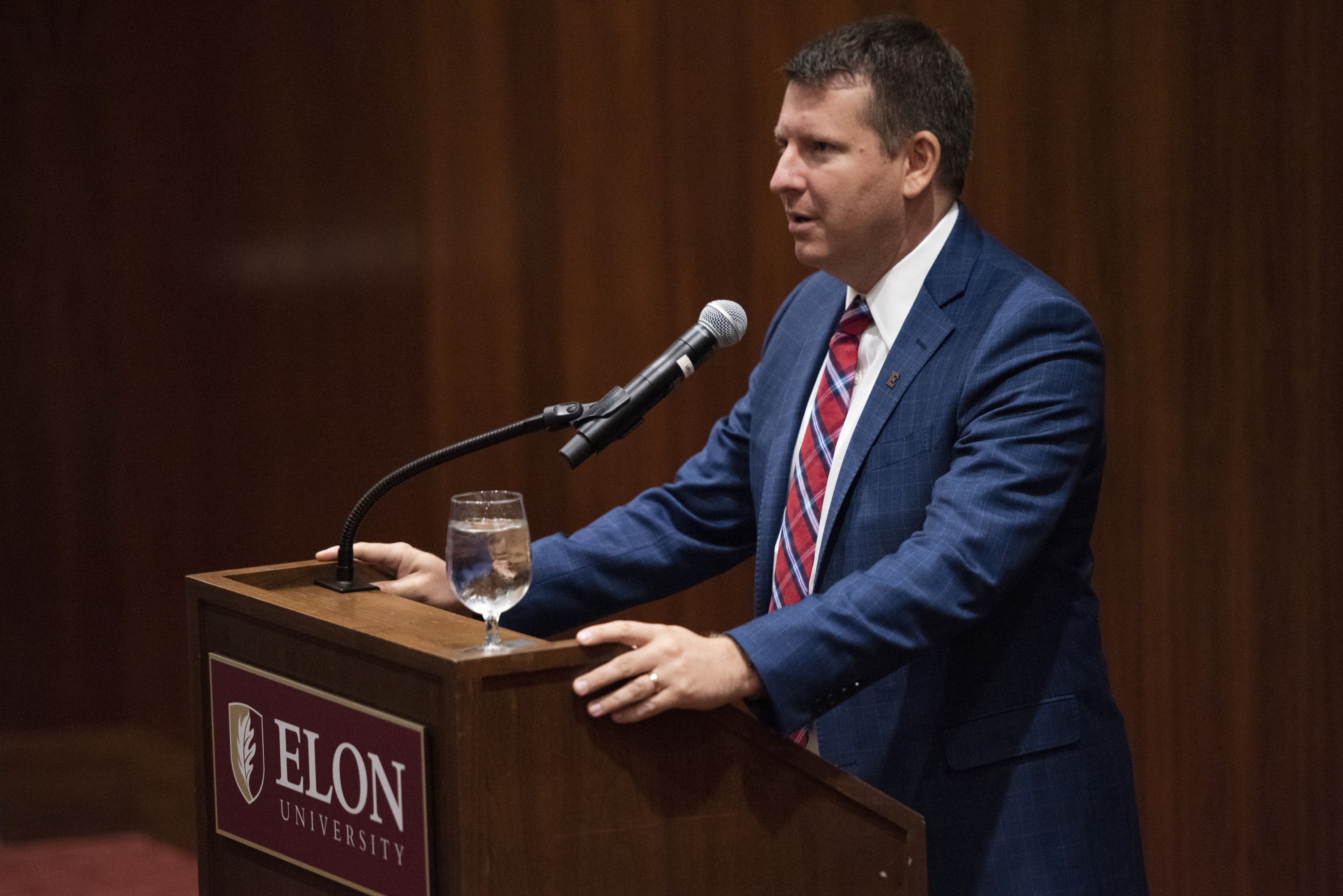Jonatan Vseviov, Estonian ambassador to the United States, spoke to the Elon community on Monday about cybersecurity and the continued importance of strong alliances in the 21st century.
Jonatan Vseviov, the Estonian ambassador to the United States, discussed cybersecurity, alliances and the future of international relations during a talk in Elon’s Turner Theatre on Monday.
Vseviov, Estonia’s former Secretary of Defense, became ambassador to the United States in August 2018. He has played a leading role in shaping Estonia’s defense policy, both domestically and abroad.
“The question I often get is, ‘OK, why should we listen [to you]? Why should we pay attention? You are representing a country that is far from here, that is small – 1.3 million people – why do you matter?'” Vseviov began.
He went on to outline the effects of a 2007 Russian cyberattack campaign targeting Estonia. The attack was in retaliation for the country’s removal of a Soviet-era World War II monument from its capital of Tallinn. Criminal hackers were paid to infect Estonia’s electronic infrastructure, including government, banking, news media and other digital systems.
Vseviov explained that it is important for countries to learn from Estonia, which suffered from the cyberattacks and then successfully rebuilt its digital infrastructure.

“The world is becoming more complex, it is becoming more dangerous – not because of international terrorism and rogue states and powers that have a fundamentally different view about how we should organize our societies,” he said. “It is becoming more complex because our own societies are changing, and simply maintaining what we have today will require smarter leaders, more effort, more engaged publics, more discussion and more cooperation amongst allies.”
Since the Russian cyberattacks, Estonia has become one of the top-ranked countries in the National Cyber Security Index by strengthening its cyber defense efforts and launching a cyber command center, which defends the nation’s cyber systems and supports NATO allies. Vseviov explained that 99 percent of Estonia’s public services, including voting, taxes, bank transactions and more, are conducted online.
“In less than one generation’s lifespan, we have not only become well off economically, but we have become the most digital nation in the world,” Vseviov said.
Estonia is also home to NATO’s Cooperative Cyber Defence Centre of Excellence, a “multinational and interdisciplinary cyber defence hub.”
Following his lecture, Vseviov fielded questions from the audience of Elon students, faculty and staff. One audience member asked the ambassador about how Estonia is taking measures to prevent another cyber crisis. Vseviov explained his country knows it must protect its digital infrastructure by prioritizing security, being transparent in the event of security concerns, keeping strong allies and preparing for any possible situation.
“I strongly believe the more aware we are, the more prepared we become,” he said.
Vseviov was asked to describe Estonia’s current relationship with the United States, which refused to recognize the Soviet Union’s occupation of the Baltic states – Estonia, Latvia and Lithuania – for nearly 50 years in the 20th century. Vseviov said U.S. support of Estonia has led to “outstanding” relations between the countries.
“We have a very close relationship,” he said. “That doesn’t mean we always agree – we don’t – but, we have open and frank discussions back and forth, our leaders meet very often, our foreign secretaries meet very often. I think we are one of the most – if not the most – pro-American nations in Europe, a reliable ally and one that the United States can always count. And, in return, we can always count on the United States as well.”

Vseviov’s visit to Elon on Monday also included time in the classroom. The ambassador spoke to Gordon Professor in Entrepreneurship Haya Ajjan’s Data Mining for Managerial Decisions course, as well as Associate Professor of Political Science and Policy Studies Sean Giovanello’s International Terrorism course.
Vseviov, who says his nation’s history has taught him to be optimistic about the future, believes the success of countries around the world depends on students learning to solve future problems.
“All of this is dependent on us as a society, creating and nurturing talents, which a university like [Elon] plays a specific strategic role,” he said. “The fate of not only the world, but our alliances and our nations is dependent upon our future generations.”



